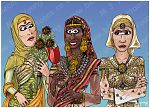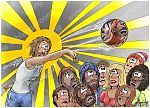Bible Cartoon: <-- Song of Songs : Isaiah -->
Click on Add to cart button below shopping cart.
Purchased Bible Cartoons do not have watermarks. Links to Cartoons provided on email once purchase is completed.Isaiah
Book type: Prophets (Major)
Author: Isaiah the prophet, son of Amoz.
No. of chapters: 66
Key character(s): God, Isaiah and his two sons, Shear-Jashub and Maher-Shalal-Hash-Baz.
Brief description: Isaiah – The holy God in judgement and redemption.
Theological outline:
01) God knows his peoples’ sins but calls them back to himself (1:1-12:6)
02) God’s sovereignty extends to all nations whether acknowledged or not (13:1-23:18)
03) God’s triumph over evils means deliverance for his people (24:1-27:13)
04) God’s people must be different (28:1-39:8)
05) God’s word for his confused people (40:1-31)
06) God’s word for his imperfect people (56:1-66:24)
Isaiah means “The salvation of Jehovah”, “Jehovah saves” in Hebrew.
The content of Isaiah falls easily into two distinct divisions: 1-39 historically set in the 8th century BC, & 40-66 historically set in the sixth century BC.
The major doctrinal points in the book of Isaiah are the following:
01) God is One.
02) God is sovereign over creation & history.
03) God is holy.
04) God is judge.
05) God is redeemer.
[Source: NIV Disciple’s Study Bible]
Isaiah is called “The Book of Salvation.” The name Isaiah means “the salvation of the Lord” or “the Lord is salvation.” Isaiah is the first book containing the writings of the prophets of the Bible. And the author, Isaiah, who is called the Prince of Prophets, shines above all the other writers and prophets of Scripture. His mastery of the language, his rich and vast vocabulary, and his poetic skill have earned him the title, “Shakespeare of the Bible.” He was educated, distinguished, and privileged, yet remained a deeply spiritual man. He was committed to obedience over the long haul of his 55-60 year ministry as a prophet of God. He was a true patriot who loved his country and his people. Strong tradition suggests that he died a martyrs death under the reign of King Manasseh by being placed within the hallow of a tree trunk and sawed in two.
Isaiah’s calling as a prophet was primarily to the nation of Judah (the southern kingdom) and to Jerusalem, urging the people to repent from their sins and return to God. He also foretold the coming of the Messiah and the salvation of the Lord. Many of his prophesies predicted events that occurred in Isaiah’s near future, yet at the same time they foretold the events of the distant future (such as the coming of the Messiah), and even some events still to come in the last days (such as the second coming of Christ).
In summary, the message of Isaiah is that salvation comes from God—not man. God alone is Savior, Ruler and King.
Themes in the Book of Isaiah:
As might be expected, salvation is the overarching theme in the book of Isaiah. Other themes include judgment, holiness, punishment, captivity, the fall of the nation, comfort, hope and salvation through the coming Messiah.
The first 39 books of Isaiah contain very strong messages of judgment against Judah and a call to repentance and holiness. The people exhibited an outward form of godliness, but their hearts had become corrupted. God warned them through Isaiah, to come clean and purify themselves, but they ignored his message. Isaiah predicted the demise and captivity of Judah, yet comforted them with this hope: God has promised to provide a Redeemer.
The last 27 chapters contain God’s message of forgiveness, consolation and hope, as God speaks through Isaiah, revealing his plan of blessing and salvation through the coming Messiah.
[Source: http://christianity.about.com/od/oldtestamentbooks/qt/isaiahintro.htm]





